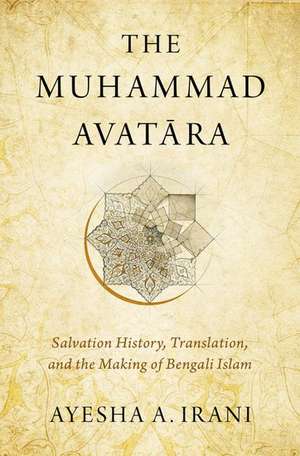The Muhammad Avatāra: Salvation History, Translation, and the Making of Bengali Islam
Autor Ayesha A. Iranien Limba Engleză Hardback – 31 mar 2021
Preț: 617.69 lei
Preț vechi: 708.71 lei
-13% Nou
Puncte Express: 927
Preț estimativ în valută:
118.20€ • 126.39$ • 98.55£
118.20€ • 126.39$ • 98.55£
Carte disponibilă
Livrare economică 17-24 martie
Preluare comenzi: 021 569.72.76
Specificații
ISBN-13: 9780190089221
ISBN-10: 0190089229
Pagini: 456
Dimensiuni: 236 x 157 x 33 mm
Greutate: 0.78 kg
Editura: Oxford University Press
Colecția OUP USA
Locul publicării:New York, United States
ISBN-10: 0190089229
Pagini: 456
Dimensiuni: 236 x 157 x 33 mm
Greutate: 0.78 kg
Editura: Oxford University Press
Colecția OUP USA
Locul publicării:New York, United States
Recenzii
Ayesha Irani's carefully researched study shows how a monumental Bengali epic, Saiyad Sultan's Nabīvaṃśa, became canonical for Bengali Muslims between the mid-1600s and the late 1800s, just when that community was becoming consolidated. Exploring how the epic subtly co-opted Hindu culture while simultaneously adapting the Qur'an to the culture of Bengal's rural masses, this book will be essential reading for students of both religious studies and South Asian history.
Saiyad Sultān's seventeenth century Nabīvaṃśa is the first major work in Bangla to tell the life of Muhammad as the Prophet. In a display of marvelous hermeneutic virtuosity, Irani unpacks the text's hagiographical function as a larger exercise in 'conversion history.' Sensitively utilizing an array of literary critical tools that converge in translation and polysystem theory—and tracing with unerring accuracy the text's Arabic, Persian, Sanskrit, Hindavi, and Bangla antecedents —Irani gently unravels the text's rhetorical and theological strategies. She argues that Saiyad Sultān appropriated hinduāni Bengal's religious world in order to write Bengal and Bengalis into Islamic history, making conversion a naturalizing process grounded in story, not a radical break with the past.
I have waited for a work like this for a long time. In the immense panorama of South Asian Islam, the study of Bengal has loomed as a vast territory only explored by a few intrepid scholars. The Nabīvaṃśa is clearly one of the most important textual monuments in this field, yet nonspecialists have not had any extended access to the text until now. This study presents an absorbing, detailed, and sophisticated picture of this rich literary creation and its role in the Islamization of East Bengal.
Much recommended for scholars across Religious studies, Islamic studies, South Asian studies, South-East Asian studies, Indian Ocean history, and early modern global history.
Saiyad Sultān's seventeenth century Nabīvaṃśa is the first major work in Bangla to tell the life of Muhammad as the Prophet. In a display of marvelous hermeneutic virtuosity, Irani unpacks the text's hagiographical function as a larger exercise in 'conversion history.' Sensitively utilizing an array of literary critical tools that converge in translation and polysystem theory—and tracing with unerring accuracy the text's Arabic, Persian, Sanskrit, Hindavi, and Bangla antecedents —Irani gently unravels the text's rhetorical and theological strategies. She argues that Saiyad Sultān appropriated hinduāni Bengal's religious world in order to write Bengal and Bengalis into Islamic history, making conversion a naturalizing process grounded in story, not a radical break with the past.
I have waited for a work like this for a long time. In the immense panorama of South Asian Islam, the study of Bengal has loomed as a vast territory only explored by a few intrepid scholars. The Nabīvaṃśa is clearly one of the most important textual monuments in this field, yet nonspecialists have not had any extended access to the text until now. This study presents an absorbing, detailed, and sophisticated picture of this rich literary creation and its role in the Islamization of East Bengal.
Much recommended for scholars across Religious studies, Islamic studies, South Asian studies, South-East Asian studies, Indian Ocean history, and early modern global history.
Notă biografică
Ayesha A. Irani is Associate Professor of Asian Studies at the University of Massachusetts Boston
